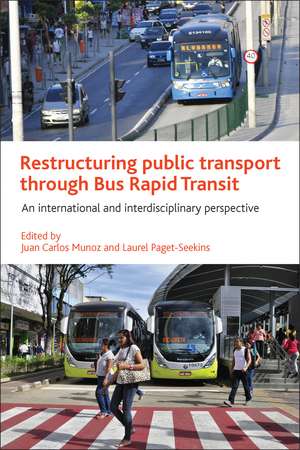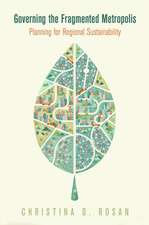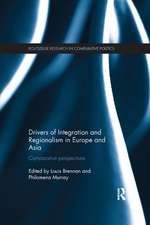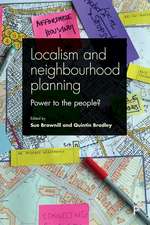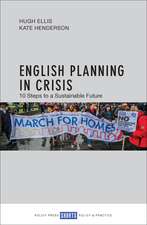Restructuring Public Transport through Bus Rapid Transit: An International and Interdisciplinary Perspective
Editat de Juan Carlos Munoz, Laurel Paget-Seekinsen Limba Engleză Hardback – 9 ian 2016
Bus Rapid Transit (BRT) is increasingly being discussed as an affordable way for cities to build sustainable rapid transit infrastructure. This is the first book to examine the opportunities presented by BRT along with the significant challenges cities face in the implementation of successful systems. The difficulties can be myriad: new institutional relationships have to be developed among governments, operators, and the public; projects have to be designed and implemented to handle large passenger flows in the most efficient manner possible; and these changes are not taking place on a blank slate, but within existing transportation systems, political and cultural contexts, and urban development patterns. Addressing these challenges from an international perspective and across a range of disciplines, from urban planning to public policy and economics, contributors offer technical solutions to specific problems and identify what still needs to be done to realize their vision of global sustainable transport.
Preț: 839.36 lei
Preț vechi: 1090.08 lei
-23% Nou
Puncte Express: 1259
Preț estimativ în valută:
160.65€ • 167.09$ • 134.63£
160.65€ • 167.09$ • 134.63£
Carte tipărită la comandă
Livrare economică 13-27 martie
Preluare comenzi: 021 569.72.76
Specificații
ISBN-13: 9781447326168
ISBN-10: 1447326164
Pagini: 320
Dimensiuni: 152 x 229 x 41 mm
Greutate: 0.79 kg
Editura: Bristol University Press
Colecția Policy Press
ISBN-10: 1447326164
Pagini: 320
Dimensiuni: 152 x 229 x 41 mm
Greutate: 0.79 kg
Editura: Bristol University Press
Colecția Policy Press
Notă biografică
Juan Carlos Munoz is associate professor and head of the Department of Transport Engineering and Logistics at Pontificia Universidad Católica de Chile, where Laurel Paget-Seekins received her PhD.
Cuprins
List of figures and tables
Notes on the editors and contributors
Acknowledgements
1. The promise of BRT
Laurel Paget-Seekins & Juan Carlos Munoz
2. Global overview of BRT and bus corridors
Luis Antonio Lindau, Cristina Albuquerque Moreira da Silva, Guillermo Petzhold & Daniela Facchini
Section 1: Institutional Relationships
3. The path toward integrated systems
Dario Hidalgo, Juan Carlos Munoz & Juan Miguel Velásquez
4. BRT as a tool for negotiated re-regulation
Onesimo Flores Dewey
5. Institutional design and regulatory frameworks
Rosário Macário, Maria Spandou & Luis Neves Filipe
6. Strategic participation for change
Lake Sagaris
7. Designing bus concession contracts
Patricia Galilea & Marco Batarce
8. Fare structures
Marco Batarce & Corinne Mulley
Section 2: BRT and the City
9. Conflict over public space
Laurel Paget-Seekins
10. Designing BRT-oriented development
Chris Zegras, Anson Stewart, Rosanna Forray, Rocío Hidalgo, Cristhian Figueroa, Fábio Duarte & Jan Wampler
11. Preferences for BRT and light rail
David Hensher, Corinne Mulley & John Rose
12. User preferences and route choice
Sebastián Raveau, Juan Carlos Munoz & Juan de Dios Ortúzar
13. Passenger information systems
Carola Zurob, José Manuel Allard, Rosário Macário, Bernardo Garcia and Camila Garcia
Section 3: Operations and Design
14. Opportunities provided by automated data collection systems
Nigel Wilson
15. Designing a BRT-based network under integrated operations
Homero Larrain, Omar Ibarra, Juan Carlos Munoz & Corinne Mulley
16. Assessing corridor performance
Juan Carlos Herrera, Juan Carlos Munoz, David Hensher, Corinne Mulley, Zheng Li & Luis Antonio Lindau
17. BRRT: adding an R for reliability
Felipe Delgado, Juan Carlos Munoz & Ricardo Giesen
18. Managing drivers and vehicles for cost-effective operations in regulated transit systems
Omar Ibarra &Ricardo Giesen
19. Road safety impact of BRT and busway features
Nicolae Duduta & Luis Antonio Lindau
20. Looking forward
Juan Carlos Munoz, Laurel Paget-Seekins
Index
Notes on the editors and contributors
Acknowledgements
1. The promise of BRT
Laurel Paget-Seekins & Juan Carlos Munoz
2. Global overview of BRT and bus corridors
Luis Antonio Lindau, Cristina Albuquerque Moreira da Silva, Guillermo Petzhold & Daniela Facchini
Section 1: Institutional Relationships
3. The path toward integrated systems
Dario Hidalgo, Juan Carlos Munoz & Juan Miguel Velásquez
4. BRT as a tool for negotiated re-regulation
Onesimo Flores Dewey
5. Institutional design and regulatory frameworks
Rosário Macário, Maria Spandou & Luis Neves Filipe
6. Strategic participation for change
Lake Sagaris
7. Designing bus concession contracts
Patricia Galilea & Marco Batarce
8. Fare structures
Marco Batarce & Corinne Mulley
Section 2: BRT and the City
9. Conflict over public space
Laurel Paget-Seekins
10. Designing BRT-oriented development
Chris Zegras, Anson Stewart, Rosanna Forray, Rocío Hidalgo, Cristhian Figueroa, Fábio Duarte & Jan Wampler
11. Preferences for BRT and light rail
David Hensher, Corinne Mulley & John Rose
12. User preferences and route choice
Sebastián Raveau, Juan Carlos Munoz & Juan de Dios Ortúzar
13. Passenger information systems
Carola Zurob, José Manuel Allard, Rosário Macário, Bernardo Garcia and Camila Garcia
Section 3: Operations and Design
14. Opportunities provided by automated data collection systems
Nigel Wilson
15. Designing a BRT-based network under integrated operations
Homero Larrain, Omar Ibarra, Juan Carlos Munoz & Corinne Mulley
16. Assessing corridor performance
Juan Carlos Herrera, Juan Carlos Munoz, David Hensher, Corinne Mulley, Zheng Li & Luis Antonio Lindau
17. BRRT: adding an R for reliability
Felipe Delgado, Juan Carlos Munoz & Ricardo Giesen
18. Managing drivers and vehicles for cost-effective operations in regulated transit systems
Omar Ibarra &Ricardo Giesen
19. Road safety impact of BRT and busway features
Nicolae Duduta & Luis Antonio Lindau
20. Looking forward
Juan Carlos Munoz, Laurel Paget-Seekins
Index
Recenzii
“This is a must-read for those who wish to invest the time, intellectual energy, and building of political will required for bus rapid transit to help foster more sustainable cities.”
“A very thorough and comprehensive review of the role of bus rapid transit, drawing on a wide range of in-depth research. Set in a broader institutional and policy context, the issues discussed are of wider application to public transport operation as a whole.”
